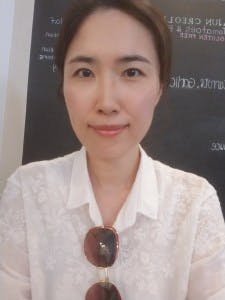Through her experience teaching English as a second language and identity as a transnational student traveling between the U.S. and South Korea, Eun Young Yeom (Ph.D.’23) amplifies the experiences of students with similar backgrounds in her research.
She earned several awards for her research projects, and her dissertation study received grant funding from Children’s Literature Assembly at National Council of Teachers of English, Korean American Educational Research Association, and the UGA Graduate School.
- Hometown: Ilsan, South Korea
- Degree objective and graduation date: Ph.D. in language and literacy education, spring 2023
- Degree(s) and graduation date: M.A. in English education, Korea University, 2018; B.A. in English Education, Ewha Womans University, 2005
I was attracted to the current programs of language and literacy education (LLED) because I was looking for an interdisciplinary department. As an English teacher who taught English as a foreign language and as a literature geek, I always wanted to combine language teaching and young adult literature for my students. The programs offered by LLED were geared toward language teaching, literacy development, and children’s and young adult literature, which were perfect for me.
Tell me about your primary research interests.
I was a middle/high school English teacher in Korea and tried to integrate young adult literature written in English into my classroom. Based on these experiences, my research includes English language teaching, emergent bilinguals’ (English learners’) literacy development, and multicultural young adult literature for diverse youth. My current research agenda is about transnational emergent bilinguals’ meaning making processes when they read multicultural young adult literature written in English.
 Your dissertation and a lot of your work centers around transnational emerging bilingual youth learning English. What drew you to this topic, and why are you passionate about it?
Your dissertation and a lot of your work centers around transnational emerging bilingual youth learning English. What drew you to this topic, and why are you passionate about it?
As a previous schoolteacher, my heart always lies in teaching teenage English learners or emergent bilingual youth. After becoming an international Ph.D. student, however, I also realized that I had an additional identity—a transnational coming back and forth between South Korea and the United States.
During the doctoral program, I was navigating my shifting identities as an Asian, an international student, a teacher, a woman, and a transnational. Then, I met Korean transnational emergent bilingual youth in Athens who came to the United States with their parents and maintained their ties with Korea while learning English as a second language. Conversation with them reminded me of my good old days as an English teacher, and their stories as Korean transnational emergent bilinguals were akin to my transnational experiences, such as having a culture shock, being a quiet student, and maintaining ties with families and friends in Korea, among many others. These stories were unheard and unheeded in research, which motivated me to study and write about their beautiful voices and experiences.
What were some of your favorite classes as a student in the Mary Frances Early College of Education?
Wow, there are so many. I was inspired by so many faculty members and classes. I would like to say I loved all the classes that I took. It was a wonderful honor for me to be able to think with and learn from the great minds at UGA.
What are your plans following graduation?
I want to become a professor to teach teacher-candidates and conduct research projects for marginalized and silenced emergent bilingual youth. But I have been missing and will be missing my good old days as a schoolteacher. Those days were the best part of my life, and I am grateful that I was able to teach my brilliant previous students, who are now in their 20s and 30s.